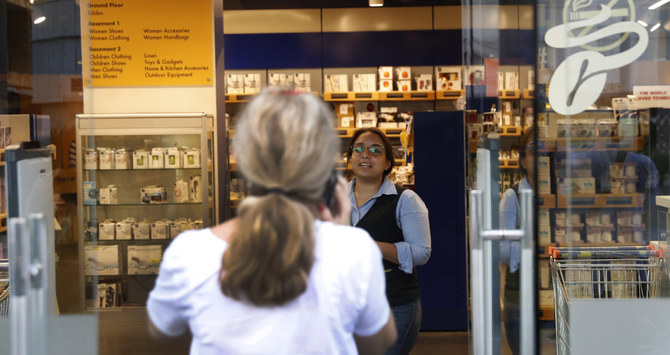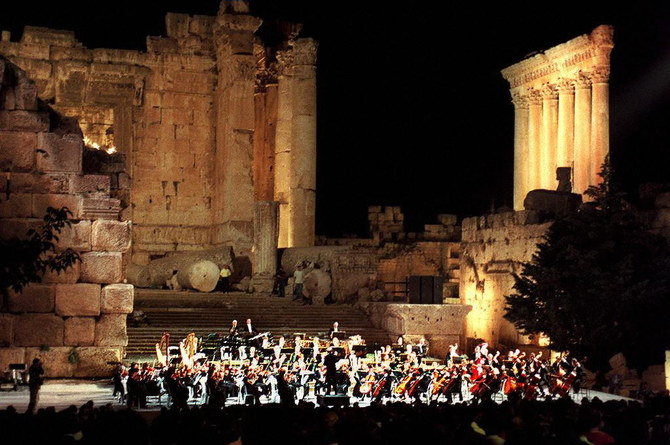by arabnews.com — DUBAI: Cyprus will no longer accept flights coming from Lebanon from July 6, national newspaper the Daily Star reported, citing a statement from the Cypriot Embassy. The statement said the decision was based on a classification system that determines countries’ epidemiological criteria amid the coronavirus pandemic. But Cypriot nationals and residents would […]

by arabnews.com — DUBAI: Model and philanthropist Jessica Kahawaty has taken to social media to raise awareness about Lebanon’s deepening economic crisis amid the coronavirus pandemic. According to reports, the economic crisis coupled with the health pandemic can lead to a famine in the Levant country. Kahawaty, who is part Lebanese and part Australian, took to her Instagram Stories to explain the seriousness of Lebanon’s worsening economic crisis and hyperinflation. “For non-Lebanese to understand the severity of what’s happening in Lebanon: $100 used to give you 150,000 Lebanese Liras,” she wrote. “Due to the deteriorating state of the country, $100 gives you 900,000 Lebanese Liras. If you’re living and working in Lebanon and your salary a year ago was 4.5 million Liras per month, today that salary is worth $450. Severe inflation is reflecting an increase in prices in the supermarkets,” she added, before urging her followers to donate to different organizations helping on the ground in Lebanon. “If you know of more organizations, please DM me so I can share,” she wrote alongside links to several Lebanese NGO’s and charities that provide assistance to Lebanese families struggling to put food on the table.


By Nasser Saidi — thenational.ae — Lebanon is in the throes of an accelerating economic and financial meltdown. Unsustainable monetary and fiscal policies and an overvalued, pegged exchange rate led to persistent fiscal and current account deficits. Public debt, which reached more than 155 per cent of gross domestic product in 2019, is projected to rise to 161.8 per cent in 2020 and 167 per cent in 2021, according to International Monetary Fund estimates. That is the third-highest ratio in the world after Japan and Greece. Informal capital controls, foreign exchange licensing, freezing of deposits and payment restrictions to protect the dwindling reserves of Lebanon’s central bank, precipitated the financial crisis, generated a sharp liquidity and credit squeeze and the emergence of a system of multiple exchange rates. The squeeze is severely curtailing domestic and international trade and resulted in a loss of confidence in the monetary system and the Lebanese pound. Multiple exchange rates created distortions in markets and new opportunities for corruption. The result is a sharp, double-digit contraction in economic activity, consumption and investment, surging bankruptcies, and rapidly rising unemployment rates estimated at above 30 per cent.
A dangerous inflationary spiral has gripped the country with the currency’s value against the dollar nosediving as much as 80 per cent. Inflation is on the rise and reached an annual 56 per cent in May, according to Lebanon’s Central Administration of Statistics. A Bloomberg survey of economists conducted in June, projects inflation will average 22 per cent in 2020 compared with a forecast of 7.7 per cent from a previous survey. The minimum wage has shrunk from the equivalent of $450 per month while food prices have surged. Since the end of a 15-year civil war in 1990, extreme poverty has hovered at between 7.5 to 10 per cent, while about 28 per cent of the population is poor, according to the World Bank. In November, the World Bank warned if the economic situation in the country worsened, those living below the poverty line could rise to 50 per cent. Given the collapse of the long-maintained peg, there is no anchor for expectations of the future value of the Lebanese pound.

by aawsat.com — Lebanon’s electricity crisis severely worsened over the past few days, with power outages extending to 20 hours per day even in the capital. Many generator owners have raised the monthly tariff because of the high cost of diesel and reduced subscription hours, which drowned several areas in total darkness that was only broken by candlelight. The electricity crisis prompted a number of stores, especially small ones, to stop buying food commodities that need a refrigerator. Minister of Energy Raymond Ghajar said that power rationing was due to the lack of fuel, citing “judicial reasons” behind the delay of delivery by fuel ships.
In response, member of the Progressive Socialist Party (PSP) and electricity expert Mohammed Basbous stressed that the ministry was required to provide further information on the matter. “It’s surprising that we currently face an electricity crisis, especially since the Algerian Sonatrach company announced that it would commit to supplying Lebanon with the amount of fuel it needs and would refrain from renewing the contract at the end of the year,” he told Asharq Al-Awsat. “The electricity crisis was supposed to start at the end of the year and not now, if no alternatives were found,” he emphasized.

by NAJIA HOUSSARI — arabnews.com — BEIRUT: Residents of Tfail, a Lebanese farming community on the border with Syria, say they are powerless to stop their farmland being destroyed by bulldozers watched over by gunmen who appear intent on taking control of the town. According to anxious residents, confusion over the boundary between Lebanon and Syrian is adding to the problem, with many sections of the border yet to be demarcated. The issue has drawn the attention of Lebanese leaders, with former prime minister and head of the Future Parliamentary Bloc Saad Hariri last Tuesday voicing his “deepest concerns” over developments in the village. Hariri suggested the threat to Tfail might be part of “a dark scheme of displacing its inhabitants as part of plans to make demographic changes in the region.”
The Lebanese-Syrian border is 380 km long, but only a 40 km section was demarcated in 1935 after greater Lebanon was established. The war in Syria has stalled attempts to demarcate the rest. Syrian Foreign Minister Walid Al-Muallem said 10 days ago that his country “will not demarcate the borders with Lebanon, neither will it accept the deployment of international forces on the borders, for this is only done among enemies.” Tfail resembles a peninsula within Syrian territory, and there is no access to the town from the Lebanese side. In order to get to other Lebanese cities or towns, residents have to go to Damascus before heading to their destination in Lebanon and vice versa. However, the war in Syria, and particularly the battles in the Syrian Qalamoun mountains, led to the displacement of Tfail’s residents, Lebanese or Syrian refugees who headed to various Lebanese regions via the town of Brital. Tfail residents work in agriculture or serve in the Lebanese army. Most of the townsmen are Sunnis.

by NAJIA HOUSSARI — arabnews.com — BEIRUT: Lebanon’s banks will ease restrictions on US dollar withdrawals following a surprise announcement on Thursday by the head of the country’s banking association. Salim Sfeir, chairman of the Association of Banks in Lebanon (ABL), said that US dollars will be supplied by the banks with the support of Lebanon’s central bank. Lebanese banks last November imposed strict limits on US dollar transfers amid an economic and political crisis that led to the collapse of the Lebanese pound. The curbs were introduced as the government and central bank struggled to ease the worst economic crisis since country’s civil war. Sfeir made his announcement after meeting Saudi Ambassador to Lebanon Walid bin Abdullah Bukhari as part of an ABL delegation.
Following the meeting, Sfeir said that he wanted to put the Saudi ambassador “in the picture of the current economic situation in Lebanon.” He praised the Kingdom’s generosity and said “economic life will be back to normal in Lebanon.” The US dollar exchange rate reached its highest level on Thursday, scoring between 9,500 and 9,600 Lebanese pounds, while money dealers adopted a rate of between 3,850 and 3,900 Lebanese pounds. Riad Salame, the central bank governor, told a government session that “the volume of US dollars circulating on the black market does not exceed 5 percent (of the hard currency market) and does not reflect the actual exchange rate of the US dollar.” Meanwhile, Lebanese political leaders held a series of meetings on Thursday amid growing popular demands for the resignation of Prime Minister Hassan Diab’s government.

by reuters.com — TRIPOLI, Lebanon (Reuters) – For Amer al Dahn, the idea of eating meat is now a dream. Today, he can’t even afford bread and depends on credit from the local grocer to feed his wife and four children in the Lebanese city of Tripoli.“We can no longer buy meat or chicken. The closest we get to them is in magazines and newspapers,” said Dahn, 55, leafing through a supermarket brochure in his cramped apartment. Living in one of the poorest streets of Lebanon’s poorest city, Dahn and his family are feeling the full force of a financial meltdown that is fuelling extreme poverty and shattering lives across the country.
In the capital Beirut, a 61-year-old man shot himself in the head on the busy Hamra street on Friday. Reuters could not establish his motives, but local media attributed the suicide to hunger. Struggling to walk because of diabetes, Dahn already faced a difficult life before the crisis which has sunk the Lebanese pound by 80% since October, driving up prices in the import-dependent economy. “Life has become very difficult. The dollar is still climbing and the state is incapable of providing a solution.” Even chickpeas, beans and lentils – a traditional part of the Lebanese diet – are out of reach for some.

Associated Press — BEIRUT: Major retailers in Lebanon announced Thursday they will temporarily shut down in the face of an increasingly volatile currency market and their inability to set prices while the Lebanese pound plunges against the dollar. Later in the day, owners of the businesses rallied in central Beirut to denounce the government’s inability to handle a deepening economic and financial crisis, and urging others to join them. “The company is losing and … (the customers) think we are robbing them,” Samir Saliba, owner of sportswear retailer Mike Sport, told The Associated Press. “We want a clear economic policy to know how to move forward and not buy our dollars from the black market and be humiliated with the brokers and money changers.” The protesters called on the government to resign and urged other stores to join their protest shutdown.
The Lebanese pound recorded a new low Thursday, selling at nearly 10,000 for a dollar and maintaining the downward slide that saw the national currency lose about 85% of its value over the past months. Despite government and central bank efforts to regulate the foreign currency rate, a parallel market has thrived and inflation is soaring as the dollar becomes increasingly scarce. Amid the tumbling pound, prices and inflation have soared. Power cuts have also increased, as the government struggles to secure fuel and diesel, while grocery stores began imposing a limit on how many items customers can buy amid a rush to hoard basic goods.

By SAMUEL HAIG — cointelegraph.com — Lebanon’s national currency continues to shed value amid the country’s deepening monetary crisis, with unofficial reports indicating that the Lebanese pound, or lira, has lost 50% of its purchasing power in less than two weeks. On Thursday, local crypto advocate Saifedean Ammous, author of The Bitcoin Standard, took to Twitter to assert that after “having lost half its value in the last 10 days, the Lebanese lira is now worth one satoshi” — comprising a historic low for the currency of roughly $0.000093. On June 21, Ammous noted that “Ten years ago, one Lebanese lira was worth 0.67 Bitcoin.” “Imagine spending 45 minutes explaining Bitcoin to a group of Lebanese people and then having one of them ask: ‘but without a central bank regulating, what guarantees Bitcon’s value?’” Ammous posted a day earlier.
Lebanon’s citizens turn to crypto
It’s hard to confirm the precise exchange rate, as Lebanon’s lira has officially been valued at $0.00066 United States dollars since 1997. However, chronic economic mismanagement has led to the emergence of a parallel market for the currency. Reports indicate it has seen its value plummet 86% in roughly one year. The accelerating crisis has crippled daily life in Lebanon, with the country now preparing for a wave of emigration as it prepares to open its sole international airport following COVID-19 restrictions. “We’re like prisoners who do nothing but try to plot our escape,” 32-year-old graphic designer Bernard Hage told Al Jazeera.

by arabnews.com —DUBAI: Lebanon’s Baalbeck International Festival is set to take place this month on July 5 despite the ongoing coronavirus, organizers announced this week. The renowned arts and culture event, however, will have no audience. It will broadcast live concerts from the heart of the Bacchus Temple, an ancient site in Lebanon’s Baalbeck at 9 p.m (Saudi time) on the festival’s Facebook and YouTube pages, MBC’s streaming service Shahid and a number of Lebanese TV channels like MTV, LBC and more. “The Bacchus Temple will harbour history, culture and arts as the City of the Sun opens virtually its gates for a one-of-a-kind live concert,” read the festival’s released statement. “The Sound of Resilience will serve as an example for future concerts to be held during the ongoing health crisis.” The program for the concert has not been revealed yet, but the festival stated that the event will celebrate Beethoven’s 250th birthday by presenting the German composer’s most famous pieces.



